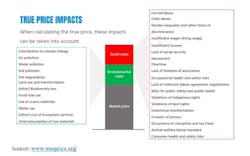The landscape of sustainability and ESG is undergoing rapid transformation. Each passing quarter sees the emergence of new regulations, with consultants actively crafting and implementing novel frameworks.
Pioneers in sustainability within the industrial sector are strategically positioning themselves as custodians of the planet, forging a robust link between sustainability and business practices.
One of these integral practices is the interconnection between true costing and true pricing. In essence, true costing represents a comprehensive methodology that encompasses all direct and indirect costs associated with a product or service. This approach ensures a more precise reflection of the total cost, accounting for both visible and hidden expenses, including environmental and social impacts. By adopting true costing, organizations gain a holistic understanding of the genuine cost of their offerings.
Conversely, true pricing transcends conventional pricing models by not only considering the true cost of production but also incorporating additional value elements. This innovative approach goes beyond the economic aspects, integrating considerations such as environmental sustainability, social responsibility and customer perceptions. The goal is to align pricing strategies with broader organizational objectives and societal expectations, creating a more holistic and value-driven pricing model.
We are in the nascent stages of exploring the possibilities within true pricing. While many companies are grappling with the complexities of true costing, it's crucial to acknowledge that a significant number of them have yet to fully embrace advanced pricing strategies. The predominant focus remains on cost-plus pricing models for products and services. The recent emphasis on ESG and sustainability is catalyzing discussions around absorbing incremental costs versus passing them on to customers—a genuine challenge requiring careful business management.
Now, what are industrial companies doing regarding true pricing? Should they shift their attention to it, or should discussions about true costing take precedence? Transparency about true pricing is a rarity, with most companies navigating the initial phases of their journey toward true costing. Some sustainability trailblazers, such as Schneider Electric, have introduced innovative programs like "Green Premium," encompassing products and services designed to minimize energy consumption and environmental impact. Schneider Electric has set a target to derive 80% of its revenue from Green Premium offerings by 2025. Similarly, Siemens, Umicore, sustainable fuel company Ne and ABB have initiated a "Sustainability Framework" with indicators measuring the environmental and social performance of their products and services. These companies share a common goal of reducing their carbon footprint by 40 to 50% by 2025.
True pricing, still in its early developmental stages, is being championed by experts associated with the True Pricing Foundation. Noteworthy implementations have been observed in sectors such as farming, retail, luxury goods and the food industry, where consumers exhibit a strong interest in fair and ethical pricing. They are more inclined to pay a premium for sustainable products, particularly in specific regions of the world. In the realm of industrial companies, resistance may surface when contemplating the passing on of true environmental and social costs to customers. It's a nuanced business decision that demands deliberate intent and heightened attention. Industrial businesses have three options:
- Recoup costs tied to environmental and social initiatives through premium pricing.
- Encourage customers to prefer more sustainable products at the same price.
- Reduce their carbon footprint and contribute to a low-carbon economy.
Here are some factors that might influence a company's decision to charge a premium:
- Market competition: If competitors are also facing similar costs, companies might be more likely to pass on the costs to maintain price competitiveness.
- Customer sensitivity: Companies may choose to absorb the ESG costs if their customers are highly price-sensitive or have limited flexibility to absorb price increases.
- Product differentiation: Companies with unique or high-value products might be able to maintain profitability by absorbing these costs, as customers are willing to pay more for the product's benefits.
- Brand reputation and sustainability: Companies prioritizing sustainability and environmental responsibility might choose to absorb the sustainability costs to maintain their brand reputation and customer loyalty.
- Regulatory environment: Companies operating in regions with strict regulations or carbon pricing mechanisms might have limited flexibility to pass on the costs to customers.
- Long-term strategy: Companies might choose to absorb the carbon costs in the short term to maintain market share and customer loyalty while investing in low-carbon technologies for long-term sustainability and cost savings.
Ultimately, companies must carefully consider their business model, market position and customer relationships when deciding whether to pass on the full or partial costs to customers. The decision will depend on various factors specific to each company's situation.
In this realm, my stance is unequivocal and assertive. Faced with escalating regulations in specific global regions and a forthcoming wave of environmentally conscious consumers willing to invest more in sustainable products, industrial companies must initiate action promptly. The strategic entry point involves a comprehensive exploration of the carbon pricing landscape and the seamless integration of carbon costing into internal financial processes.
Simultaneously, companies should pay vigilant attention to burgeoning start-ups that have adeptly implemented new business models grounded in the tenets of true pricing. Furthermore, astute pricing decisions should be a focal point, with the incorporation of True Value Pricing into the pricing toolbox, particularly in situations where a leadership position is held, and the objective is to deliver discernible value to eco-sensitive clientele.
The question of recouping the entire true cost of ESG remains challenging at present. However, a more pertinent inquiry arises: Can I leverage my current leadership position in ESG to command a premium, grounded in the economic value I contribute to sustainability-conscious customers?
Stephan Liozu is founder of Value Innoruption Advisors, a consulting boutique specializing in industrial pricing, XaaS pricing and value-based pricing. He is also the co-founder of Pricing for the Planet, which specializes in pricing for sustainability. Stephan has 30 years of experience in the industrial sector with companies like Owens Corning, Saint-Gobain, Freudenberg and Thales.
About the Author
Stephan Liozu
Chief Value Officer, Zilliant
Stephan Liozu, Ph.D. is chief value officer at Zilliant, a pricing management and optimization software provider. He brings over 20 years of experience in pricing, innovation and value management. An expert in the global pricing landscape, he is the author of over 15 pricing books, including “Pricing—The New CEO Imperative” (2021) and “Value-based Pricing: 12 Lessons to Make Your Transformation Successful” (2024).

